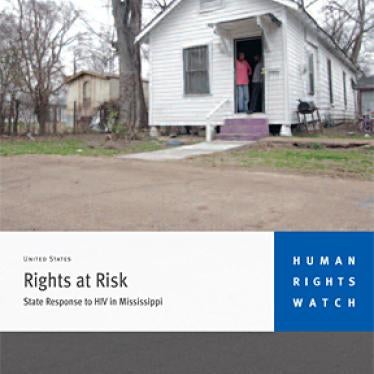(Jackson) - Thousands of Mississippians are at risk for HIV, and many who are infected are denied lifesaving measures and treatment because of counterproductive state laws and policies, Human Rights Watch said in a report released today. Mississippi has resisted effective approaches to HIV prevention and treatment and instead supported policies that promote stigma and discrimination, fueling one of the nation's highest AIDS rates, Human Rights Watch said.
The 59-page report, "Rights at Risk: State Response to HIV in Mississippi," documents the harmful impact of Mississippi's policies on state residents, including people living with HIV and those at high risk of contracting it. Mississippi refuses to provide complete, accurate information about HIV prevention to students and threatens criminal penalties for failing to disclose one's HIV status to sexual partners. At the same time, Mississippi provides little or no funding for HIV prevention, housing, transportation, or prescription drug programs for people living with HIV, and the state fails to take full advantage of federal subsidies to bolster these programs. In Mississippi, half of people testing positive for the virus are not receiving treatment, a rate comparable to that in Botswana, Ethiopia, and Rwanda.
"Many people living with HIV in Mississippi can't get to clinics, can't afford treatment, and can't keep a roof over their heads, while young people can't get essential information about how to protect themselves," said Megan McLemore, senior health researcher at Human Rights Watch. "These are public health failures that threaten fundamental rights to life and health of all Mississippians."
Human Rights Watch interviewed more than 65 people in Mississippi for the report, including people living with HIV and AIDS, AIDS service organizations, and public officials throughout the state.
In Mississippi, the highest rates of HIV exposure are among men who have sex with men, while heterosexual women are the second-largest group affected by the disease. Young people in Mississippi are becoming infected with HIV at increasingly high rates, and racial disparities in HIV and AIDS infections are dramatic. African-Americans constitute 37 percent of the population but 76 percent of new cases of HIV.
"HIV is taking a devastating toll on African-American communities in Mississippi," McLemore said.
One husband and wife interviewed by Human Rights Watch are both HIV-positive. He is in a wheelchair, debilitated from AIDS, and they live in constant fear of eviction as their limited income is barely sufficient to pay the rent. Despite evidence that housing is critical to the ability of individuals with HIV to maintain their health, and the state's own estimate that 3,500 people with HIV will have unmet housing needs in the next five years, Mississippi provides no funds for housing for people living with HIV and AIDS.
"We survive by the grace of God but not much else," Sheila R. (a pseudonym), told Human Rights Watch about their daily struggle to meet basic needs.
Mississippi is among the poorest of all US states, which entitles it to substantial federal funds that could support HIV/AIDS housing and health care services. Yet it has consistently failed to take full advantage of these funds. The state recently sued to block national health care reform legislation that would expand Medicaid eligibility for many people living with HIV, with the cost borne primarily by the federal government. According to the report, Mississippi's unwillingness to accept federal support for its residents with HIV contributes to death rates from AIDS that are far higher than the national average.
Mississippi also clings to failed approaches to sex and HIV education, Human Rights Watch said. Mississippi has some of the nation's highest rates of chlamydia, gonorrhea, and syphilis, sexually transmitted diseases that can significantly increase an individual's risk of becoming infected with HIV. Yet the state legislature has repeatedly refused to approve programs that provide complete, accurate information about HIV and pregnancy prevention, insisting on ineffective abstinence-only curricula in the public schools. The result, Human Rights Watch said, is the denial of potentially life-saving information to adolescents, putting them at unnecessary risk of HIV infection.
Mississippi‘s laws and policies contribute to the extreme stigma associated with HIV, which for many people is more frightening than the disease itself, Human Rights Watch said. One woman told Human Rights Watch that she threw out her AIDS medications when staying with relatives for fear that they would discover her HIV status.
Human Rights Watch found that Mississippi laws and policies contribute to the problem by promoting prejudice and discrimination against those vulnerable and perceived to be vulnerable to HIV. Numerous legal provisions, including constitutional amendments, discriminate against homosexuals, and state sex education laws marginalize lesbian, gay, bisexual, and transgender youth. In some instances, state public health workers have been found to harass and threaten people testing positive for HIV.
Human Rights Watch also described the negative consequences of Mississippi laws that criminalize the potential exposure of another person to HIV. Domestic and international health organizations have urged the rejection of such laws because they undermine HIV prevention efforts. Such laws promote misinformation about HIV transmission, for example, by including behaviors such as spitting and biting that are not associated with spread of the virus. They also threaten the health and safety of women living with HIV, who may fear violence or other negative consequences if they disclose their status. These laws also penalize those who know their HIV status, providing an incentive for people to avoid HIV testing.
Mississippi's HIV epidemic is growing fastest among men who have sex with men, a population that remains largely underground and out of the reach of public health services. The report finds that Mississippi laws prohibiting adoption by homosexuals, constitutional amendments banning gay marriage, and other anti-gay laws and policies contribute to the problem by fostering prejudice and stigma. One man told Human Rights Watch, "Being gay with HIV in Mississippi is a terrible curse."
"Mississippi's approach to AIDS is not working," McLemore said. "Mississippi needs to update its policies, ensure adequate funding, and respect human rights."






